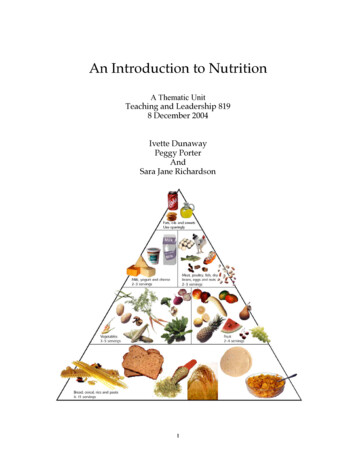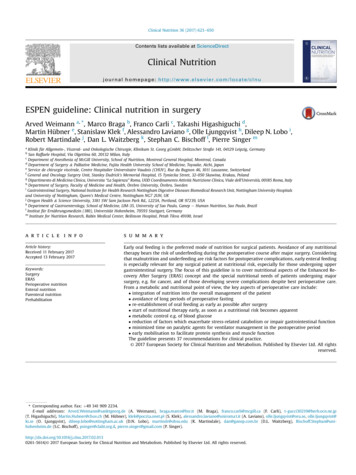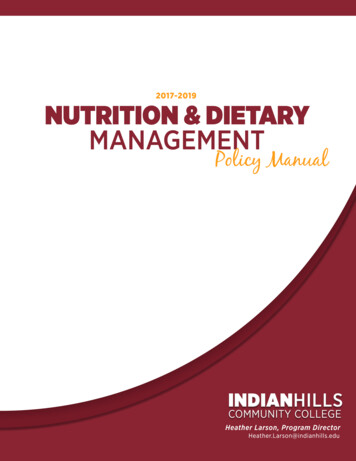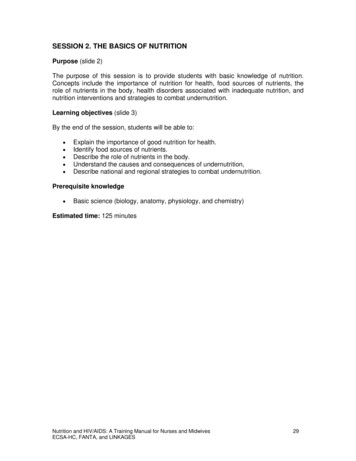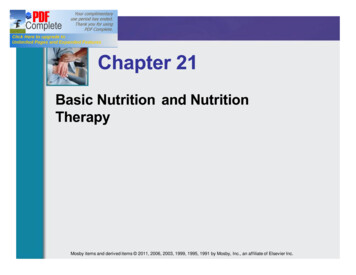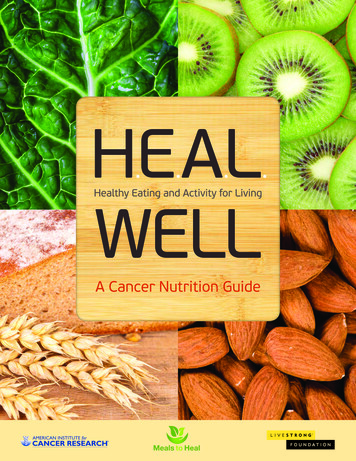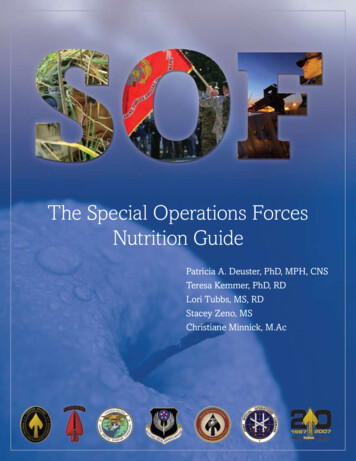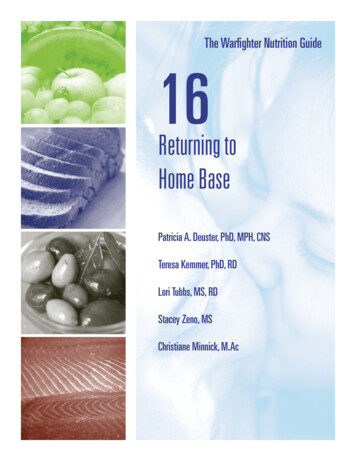
Transcription
The Warfghter Nutrition Guide16Returning toHome BasePatricia A. Deuster, PhD, MPH, CNSTeresa Kemmer, PhD, RDLori Tubbs, MS, RDStacey Zeno, MSChristiane Minnick, M.Ac
16 Returning to Home BaseIn This ChapterThe RealityDown Time Rejuvenation ResetDiet, Exercise, andStress ConnectionsSpecial GatheringMeal Planning StrategiesAlcoholKey Points Rest and rejuvenation should be emphasized upon return from deployment to re-optimize mental and physical performance. A good night of sleep in a comfortable bed and dark room is essentialfor recovering from deployments. A balanced diet high in complex carbohydrates, such as vegetables,fruit and whole grains, can enhance stress resistance. Good nutrition and regular exercise are excellent antidotes to stress. Avoid binge eating and drinking upon returning from deployments.Excess food and alcohol intakes can lead to unwanted weight gainand is detrimental to overall health. Click here for moreabout operationalrations. This site offersinformation such asmenus, prices, and weight.Professional athletes have the luxury of going home soon after competition, so life can return to normal. In contrast, Warfghters may beaway for extended periods of time and, during those times, can bedepleted of essential nutrients needed for health. Choices in food andbeverages may be limited in areas without military food service support andlocal foods may be unsuitable due to sanitation issues. Limited choices canresult in signifcant weight loss. Upon returning home, many will “pig-out”and “drink-like-a-fsh,” which transforms the warrior athlete into a less thanoptimal machine. This chapter will provide information about how to regainhealth and become nutritionally replete upon returning to home base.The RealityMany military personnel have expressed concerns about their eating anddrinking behaviors upon returning home after a deployment. Stress incurredover the preceding months can sometimes lead to unhealthy decisions thatmay add greater stress to an already stressful life. Weeks or months awayfrom home can result in feelings of having been deprived of comforts, suchas alcohol and favorite foods. This can promote binging on previously unavailable food and beverages. Signifcant problems, such as weight gain, alcohol dependency, driving under the infuence, domestic problems, and even
180work related conficts may occur. Choosing good food and making positivelifestyle choices are essential for a smooth transition. Healthy food choicesand limiting alcohol consumption will minimize weight increases and helpavoid weight fuctuations (gains and losses). Repeated weight loss and/orgain can affect overall military performance and render a fnely tuned human vehicle antiquated or useless before its time.Down Time Rejuvenation ResetRest is one of the most important aspects of recovery. Mental and physical stressors are common during deployment and resetting the stress-response system is important. Lack of sleep, stress, and inadequate nutritiondisrupt the body’s fnely regulated internal rhythms. Time off upon returnfrom deployment is essential for reconnecting with family, normalizingroutines within the household, and resetting internal rhythms.SleepSleep is vital for re-establishing normal daily rhythms, which are necessary for optimal mental and physical performance. Most hormones, suchas the stress hormone, cortisol, and human growth hormone, have dayand night cycles: they are greatly affected by loss of sleep. One third of aperson’s life should be spent sleeping. Most operations away from homeallow for minimal sleep, so time at home should ensure high quality, restorative sleep. Sleep is important for: Growth and development. Restoration of the nervous system. Immune function. Memory and learning. Mood improvement and human behavior. More information on sleep.Sleep is critical—for the brain and the body.In contrast, chronic lack of sleep increases the risk of developing: Obesity. Diabetes. Cardiovascular disease. Opportunistic infections. Mood disturbances.
181Lack of sleep affects two major body systems: the "master" hormoneregulating gland and the autonomic (automatic or involuntary) nervoussystem. Many factors that control the release of important hormones areregulated during sleep. Also, the signals that usually allow us to be alertand vigilant when awake are maintained in an active state in the absenceof sleep. Sleep allows this “sympathetic” nervous system to be reset andrestored for the upcoming day. Returning home from deployment is an important time to make sleep a priority. This allows the body to reset biologicrhythms and prepare for repeated military training phases.Sleeping and feeding are closely related because the hormones regulatingappetite (leptin, ghrelin, and insulin) are strongly infuenced by the amountof sleep. Sleep deprivation creates an imbalance in the signals for energybalance, and may lead to obesity. According to the Department of Healthand Human Services, people who sleep on average, fve hours a night aremore likely to become obese over time compared to people who sleep seven to eight hours a night. One other potential effect of a continually activenervous system and lack of sleep is the development of glucose intoleranceor predisposition to Type II diabetes. This is of utmost concern.Sleep DisturbersFactors that may prevent a good night’s sleep include: Caffeine: Receptors that trigger sleep are blocked by caffeine. Nicotine: May act as a stimulant and decrease ones ability to fallasleep; nicotine withdrawal may cause early awakening. Alcohol: A sedative that prevents deep, restorative sleep (REM). Pain Relievers: Most contain caffeine. Exercise: Daytime exercise may improve sleep, but exercising 1–4hours before bedtime may cause insomnia. Medications: Decongestants, steroids and beta-blockers can decreaserestorative sleep.How Much Sleep is Enough?Every person requires a certain amount of sleep: anywhere from 5–10hours nightly. Whether a person is getting enough sleep can be determinedsubjectively from various signs and symptoms. Selected signs of sleep deprivation include: Diffculty waking up in the morning. Diffculty concentrating. Falling asleep during work or class. Feelings of irritability, depression, anxiety, and/or moodiness.Each menu providesabout 1,540 kcals (15%protein, 35% fat, and50% carbohydrate).
182Researchers in Australia developed a “sleepiness” scale (EpworthSleepiness Scale), which is used around the world to measure sleep deprivation. Questions about the likelihood of dozing off in selected situationsare asked and the most appropriate answer for each situation is chosen; ascore is tallied based on the responses. Total scores are assigned a sleepcategory ranging from “Enough” to “Severe Sleep Debt."Click to complete the Epworth Sleepiness Scale and see if your sleep isadequate.What is Good Sleep?Individuals who are tired fall asleep within fve minutes or less. Goodsleep usually means sleeping in one’s own bed, which should be comfortable and quiet. If your partner typically disturbs your sleep, switch to aqueen- or king-size bed. Also, try different mattresses and pillows. Otherconsiderations for good sleep include: Finding a therapeutic pillow that cradles the neck and allows for sleeping on one’s side. Making the bedroom a place for sleeping so the body knows the bedroom is a place for rest. Making certain the room has adequate airfow and is neither too hotnor too cold. Using a fan to block out various noises. Hiding the clock so the time and the light can not be seen. Making sure the room does not “rise with the sun:” the room needs tobe dark in the morning.StressStress in life is inevitable, and life is all about confronting challenges.The body’s two main stress-response systems are the autonomic nervoussystem (discussed above) and the hypothalamic-pituitary adrenal (HPA)axis. Chronic stress can disrupt the regulation of these two systems. Forexample, lack of sleep can affect hormones like cortisol and growth hormone, among others.Dealing with stress when returning home is not easy. Loved ones athome have not had the same experiences. Loved ones may feel stressedas well, and overly stressed people are not always attentive. Everyone perceives their particular stressors as very important, and there is no way tochange this perception. What is clear is that the stress of war, which isconsidered an extreme stress, can lead to violent, abusive or threateningbehaviors. Upon return from war, alcohol and other drugs are often usedto reduce stress, but, in reality, they create more stress. It is also important
183to realize that overly stressed people are more likely to smoke, have poordietary habits, and be physically inactive.Warfghters are mentally and physically resilient individuals, and mostare likely to experience Post-Traumatic Stress Growth (PTSG), rather thanPTSD. PTSG implies inner growth and increased determination—unlikePTSD. Nevertheless, conversations with team members and other Warfghters about deployment experiences are healthy and can be cathartic.Military commands have embedded operational, combat-focused psychologists who are familiar with unit missions, demands, and lifestyles; thesepersons are available to speak with military personnel at any time. Theycan inspire and promote PTSG. In addition, Family Services are availableon Navy, Marine Corps, Army, and Air Force bases. These services provideresources for stress management, improving relationships, money management, and referrals to help resolve family and personal issues. Suchresources are invaluable upon re-entry after deployment.Good nutrition and regularexercise are excellentantidotes to stress.Diet, Exercise, and Stress ConnectionsResearch continues to show a strong relationship between nutrition andstress, and exercise and stress. A high-fat, high-sugar diet in combinationwith chronic stress are major factors in the development of obesity. Incontrast, selecting a diet rich in complex carbohydrates, such as colorfulvegetables, fruits, and whole grains, can help enhance stress resistance.Upon returning home, if body weight is 10–15 pounds lower than predeployment, it is easy to feel comfortable selecting “comfort” foods (highfat/high-sugar), but before long, weight creeps back up and exceeds whatis optimal for missions. Making wise diet and exercise choices will promote a more rapid readjustment.Anti-Stress DietAn anti-stress diet will do wonders upon returning home. It is becoming clear that stress can lead to obesity because of the stress hormonecortisol. Eating an anti-stress diet means resisting an increase in body fat,which typically accumulates in a man’s belly. Products and foods to avoidfor minimizing stress on the body include: Caffeine. Hard liquor. Tobacco. Trans-fats from fried foods, red meats, and highly processed foods.Essential nutrients are important in combating stress. These include theminerals, zinc and magnesium, and vitamins C, B, and E. The B vitaminsand magnesium are involved in the production of serotonin, which helps Click here formore information onshopping, cooking, andmeal planning.
184regulate mood and relieve stress. Foods high in these nutrients are thefoods of choice. If one had to develop a list of foods important for countering stress, many whole foods would be on the list. Table 16–1 providesa list of foods that will help alleviate or prevent some of the consequencesof chronic stress. In addition, these foods will help minimize weight gaindue to overeating and excess intake of high-fat, high-sugar foods. If 90%of the foods selected can be from the list of nutrient dense foods, the other10% can be from “comfort foods."Sudden weight gain due to overeatingand excessive alcohol consumption willcompromise performance and health.Table 16 –1. Top Foods for Combating StressAlmondsGreen tea, herb teas,lemon waterSweet potatoes, beetsBroccoli, zucchini, green beansWhole-grain rice or pastaSushiGoat Cheese, wheyCarrots, tomatoes, peasCantaloupe, other melonsSalmon, other cold water fshBlueberries, kiwi, grapesGarlicExerciseExercise will alsoprevent belly bulgeand deconditioning.Physical exercise is one of the most effective ways of relieving stress.The act of physical exertion causes the body to release chemical substances (endorphins) similar in nature to opiates. These natural substancesmake us feel good and have no adverse effects, unlike many other drugs.Regular exercise should be a scheduled part of any returning home plan—it may be in the form of enjoyable recreational activities, such as camping,hiking, basketball, surfng, cycling, or running and weight lifting. Makingroom for exercise will help keep life issues under control and promoterelaxation.
185Meal Planning Strategies for Special GatheringsThe key to avoid gaining excess pounds is to make smart selections atparties. The rule “it is not a good idea to shop at the commissary whilehungry” applies to parties; do not attend a party on an empty stomach.The following strategies can help maintain nutritional balance, while stillhaving a good time: Eat a regular meal before the event to avoid overeating. Eat breakfast to control hunger and avoid the tendency to overeat. Drink water to avoid dehydration, and minimize hangover symptoms,from alcoholic beverages: one glass of water should be drunk for every glass of alcohol consumed. Focus on appetizers: variety in selection and appropriate portion sizeare key. Resist deep-fried appetizers: stock the plate with shrimp and vegetables. Resist cream based soup, cheese-flled dishes, pies, pastries, and manybaked goods. Choose fruits and vegetables, as well as whole grain breads and crackers, that are high in dietary fber. They will curb appetite, taste greatand add vitamins and minerals. Choose sweets made with dark chocolate. A small amount of darkchocolate can be healthy and satisfying. Drink sparkling apple juice or cider, seltzer mixed with fruit juices, favored calorie-free water and/or low-sodium vegetable juice to maintain hydration and avoid a hangover.AlcoholAt least 23% of service members admit to drinking heavily—a statisticthat hasn’t been lowered in over 25 years. Alcohol-related incidents (DUI,drunk and disorderly, alcohol related reckless driving, sexual assaults, suicidal attempts) continue to rise at alarming rates, and teams have beenformed to assess what is being done and what should be done to addressthe problem. A 2007 report from the Department of Defense Task Forceon Mental Health noted a three-fold increase in alcohol-related incidentsfrom the third quarter of FY 2005 to the third quarter of FY2006. Unfortunately, no noticeable increases in persons entering the alcohol programaccompanied the rise in incidents. In fact, only 41% of Warfghters involved in alcohol-related incidents were referred to the alcohol program. More informationon energy balanceand binge eating.
186In addition to alcohol-related incidents, alcohol contributes to obesityand belly fat. Alcohol provides 7 kcal per gram of empty calories—its nutrient density is low. The liver processes alcohol, which is why many alcoholics and heavy drinkers experience liver damage.Alcohol abuse is a problem and returning home from deployment is acritical time for abuse to surface.How Much Alcohol is Enough?Two servings are considered moderate. One serving consists of: A 12-oz bottle or can of beer. A 5-oz glass of wine. A shot of liquor or spirits (either straight or in a mixed drink).Click for a list of calories in various alcohol beverages.Calories from alcohol tend to be storedin the abdomen as belly fat.“For many people, moderate drinking is probably safe. It may even havehealth benefts, including reducing your risk of certain heart problems. Anything more than moderate drinking can be risky. Binge drinking—drinkingmore than fve drinks at a time—can damage your health and increase yourrisk for accidents, injuries, or assault.”—National Institute on Alcohol Abuse and AlcoholismIt is recognized that alcohol (wine) in moderation (two drinks a day formen) increases good cholesterol (HDL). However, beyond these amounts,alcohol has many harmful effects, and moderation requires forethoughtand discipline.Binge DrinkingBinge drinking is a signof being overstressed.Binge drinking is drinking until intoxicated over a period of at leasttwo days. Being repeatedly intoxicated overrides participation in usual activities and fulfllment of other obligations. According to results from theArmy’s “Self Reported Health Risk Appraisal” of 404,966 soldiers, “thoseconsuming more than 21 drinks per week were at six times the risk forsubsequent alcohol-related hospitalizations.”Relationships and internal rhythms will be seriously compromised ifalcohol is substituted for good food, performance, and health.
Diet, Exercise, and Stress Connections Research continues to show a strong relationship between nutrition and stress, and exercise and stress. A high-fat, high-sugar diet in combination with chronic stress are major factors in the development of obesity. In contrast, selecting a diet
